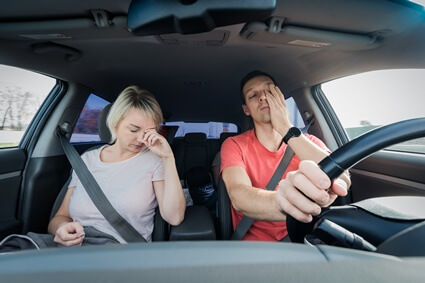Last Updated on February 10, 2024 by Louise Carter
Long car journeys require a driver’s concentration but often allow passengers to nap. It’s common to feel sleepy in moving cars, and understanding why is essential to drivers remaining safe and alert.
The steady, rhythmic vibrations provided by a moving car seat relax the mind and body, lulling us into a state of drowsiness, especially when accompanied by white noise from a moving vehicle.
Keeping the windows of a car closed will make you sleepier as you breathe in recycled air, and forcing yourself into a small, cramped vehicle will restrict airflow, leading to lethargy and sluggishness.
Long car rides can be monotonous, especially if you’re driving down unending strips of freeway.
This can lead to “highway hypnosis.” This is a trance-like state where drivers and passengers zone out in a car due to endless routine and unchanging behavior.
If you get motion sickness and your personality changes in a moving car, growing irritable and reluctant to engage with others, you may have a neurological condition called “sopite syndrome.”
Why Do I Sleep Better in a Moving Car?
Falling asleep in a moving car is called “carpolepsy.” You may grow involuntarily drowsy when driving or seated on the passenger side when in motion in a vehicle.
Why do I always fall asleep in a moving vehicle? Here’s the likely explanation:

Rocking Motion
Parents of young children often find that driving around at night aids restfulness and sleep. This is due to the gentle, rocking motion a moving car generates.
A study published in Industrial Health explains that anybody subjected to regular, rhythmic vibrations for around 20 minutes will grow increasingly drowsy, potentially involuntarily.
The human brain will quickly become attuned to these vibrations and find them comforting and relaxing.
Some scientists theorize that this is because the physical movement reminds us of being gently rocked to sleep in a pram as a child, bringing us full circle.
White Noise
Moving cars without a radio playing or conversation is subject to a wide array of white noise.
These could include the sounds of the engine, fans, or heaters and the rhythmic swishing of windscreen wipers if traveling during rainfall.
White noise relaxes the brain, especially if it blocks unsettling background noise. Sleep Medicine stated that white noise lulls occupants of noisy metropolitan areas into sleep.
Combining the white noise produced by a moving vehicle with the rhythmic vibrations of a moving car eases us into a state of relaxation that leads to drowsiness if the brain isn’t otherwise stimulated.
Limited Airflow
If you grow tired in a moving car, open the windows and improve ventilation.
The longer you spend in a moving vehicle car without ventilation, the more recycled air you’ll breathe in. This will dull your senses and cognitive function.
Introducing fresh air to a car fills the lungs with oxygen, keeping you mentally alert.
Cramped Space
If you frequently fall asleep in some cars and not others, consider whether the dimensions of the vehicles are responsible. A smaller, cramped car with limited legroom is likelier to make you sleepy.
You’ll place more pressure on the chest if you lean forward in a car and can’t recline due to space restrictions. This will restrict airflow around the body, meaning less oxygen reaches your brain.
If you travel this way, take regular breaks to give your body a break.
Monotonous Surroundings
Some car journeys are more interesting than others, depending on your route.
Traveling through country roads or bit cities filled with landmarks may provide something to look at, and if you’re taking an unfamiliar journey, you’ll likely need to focus more on directions.
If you drive straight down an uneventful freeway for hours, lacking visual stimulus or needing to make turnings and exits, you may enter a psychological complacency called “highway hypnosis.”
Highway hypnosis is a trance-like state dangerous for drivers, as it can delay reaction time to unexpected events. Passengers who grow bored of their surroundings are likelier to doze off.
Sopite Syndrome
If you’re prone to travel sickness and sleepiness in a moving vehicle, you may have sopite syndrome. This neurological concern causes nausea, irritability, and fatigue when in motion.
According to Aviation, Space, and Environmental Medicine, the symptoms of sopite syndrome include:
- Involuntary yawning.
- Feelings of drowsiness.
- Lack of interest in physical or mental activity.
- Disinclination to engage with others, i.e., car games.
The problem is that many of these symptoms could also apply to being overtired, not enjoying long car journeys, or being in a bad mood.
What Does Sleeping in a Car Do to the Body?
It may be easy to fall asleep in a moving car and even remain in this state for some time. When you exit the vehicle, brace yourself for backache and muscular pains.
If you sleep in a moving car, you’ll be seated upright without moving. Slumping forward, held in place by a seatbelt, can lead to a curvature in the spine and misalignment of the neck and shoulders.
Sleeping in a hot car on a hot day may also cause dehydration. As well as provoking feelings of confusion and sleep inertia when you wake, you may find your extremities numb.
Is It Safe To Sleep in A Moving Car?
Sleeping in a moving car is usually safe, but take some precautions. No matter how tired you are, never lie down on the back seat when a vehicle is in motion because you’ll be unable to fasten the seatbelt.
Air circulation may become an issue if you sleep in a car for hours without windows open. While it’s unlikely you’ll sleep long enough to risk carbon monoxide poisoning, it’s better to be safe than sorry,
Napping for an hour in a moving car is usually fine if you’re a passenger, but try to stay awake for the driver’s sake. They’ll likely feel drowsy and appreciate conversation to keep them awake.
How To Stay Awake in A Car
The easiest way to stay awake in a moving car is conversation.
Whether this involves making small talk, playing car games, or discussing what’s going on in the world, engagement and interaction will keep the brain sharp.
If you’re driving alone, this won’t be an option. Never use a cell phone while driving. Instead, rely on other techniques to avoid sleepiness. Here are some ways to stop falling asleep in a moving car:
Plan The Journey
Plan your journey before you set out, drive at the right time, and schedule regular breaks.
While it may be tempting to get on the road as early as possible, midnight to 6 AM is subject to the most road traffic accidents. Avoid driving at these times.
Review the location of rest stops and ensure you take a break occasionally. If you don’t continue your journey in an indefinite, straight line, you’re likelier to stay alert and avoid highway hypnosis.
Check Mirrors And Road Signs
Practicing good driving rules is another way to combat highway hypnosis on long journeys.
This involves regularly checking your rearview and side mirrors, even if you consider this unnecessary, and paying attention to every road sign you pass.
You can even turn this into a game by considering how many road signs you know and recognize. If you passed your driving test some time ago, you may be surprised how many you don’t know on sight.

Listen To Music
Music is an alternative to conversation, especially if you choose unfamiliar music. While there’s a comfort to listening to your favorite songs, the brain may start to tune them out after a time.
Transportation Research stated that mid-tempo music is the most effective in reducing fatigue. Heavy metal, hip hop, and dance genres are associated with increased speeding and risk-taking in young drivers.
Talk radio stations on a car radio can also keep the mind engaged and replace the conversation provided by a passenger. Avoid switching stations while driving because you’ll take your eyes off the road.
Temperature Control
A cold car is just as likely to make you sleepy as an overly warm car.
If the temperature drops below 68°F, you’ll instinctively feel sleepy, and your body and brain will begin to close down. Turn up the heating a notch to maintain alertness.
Falling asleep in a car is natural and rarely a concern for a passenger, but drowsiness behind the wheel is a hazard for drivers. Understand the risks and take steps to remain alert.







